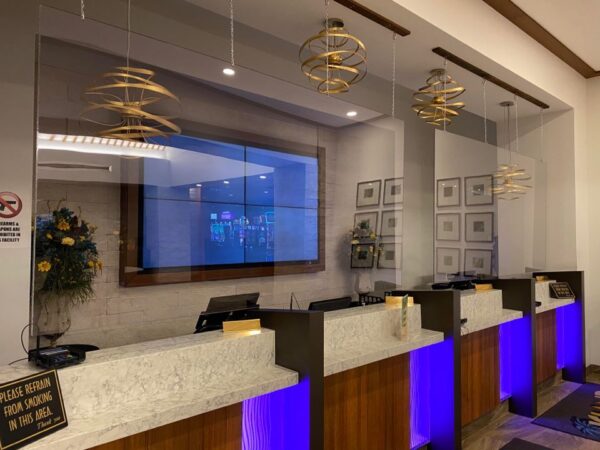
- Details
- By Native News Online Staff
HARRIS, Mich. — Ten days after it was originally planned, the Island Resort and Casino reopened its doors for business on Saturday, May 16.
The facility had been closed since March 21, when it voluntarily shuttered its doors due to concerns for the health and safety of its team members and customers related to COVID-19.
The Island Resort and Casino is located in Michigan’s Upper Peninsula. It is owned and operated by the Hannahville Indian Community, a federally recognized Potawatomi tribe.
The 10-day delay in reopening was due to a letter the tribe received from Michigan Attorney General Dana Nessel’s office and the Menominee County Prosecutor Jeffrey T. Rogg. In the letter, Nessel and Rogg told the tribe, citing Michigan Governor Gretchen Whitmer’s stay-at-home order, it should limit the resort and casino’s operations; otherwise, the tribe’s enrolled members living off reservation and customers could be cited and subject to civil and criminal penalties.
After the letter, representatives from the State of Michigan had discussions and a conference call with tribal leaders, Michigan Governor Gretchen Whitmer, MDHHS Chief Medical Executive Khaldun and other State offices, a spokesperson for the Michigan Attorney General’s office told Native News Online last week.
Following those discussions, the Hannahville Tribal Council decided to move ahead with reopening.
“The Tribal Council made their decision to open based on data from the Michigan Departments of Health, the rate of infection in the three-county area surrounding the Casino and the full range of precautions to be implemented for the safe operations of the gaming facility,” Hannahville Indian Community Tribal Chairperson Kenneth Meshigaud told Native News Online on Tuesday.
 Photographs courtesy of the Hannahville Indian Community.
Photographs courtesy of the Hannahville Indian Community.
When asked about the reopening of the Island Resort today, a spokesperson for the Michigan Attorney General’s office told Native News Online that they had no comment at this time.
Meshigaud pointed out that the resort and casino have taken precautionary steps to mitigate the spread of the coronavirus. The most notable change is the requirement for all employees and guests to wear masks on the gaming floor.
Other notable changes are: Smoking is not permitted in any area of the facility at this time; plexiglass shields are in place; hand sanitizer stations have been increased; and social distancing is encouraged.
Currently, only slot machines are open with limited bingo. Social distancing guidelines are in place at the hotel and both of the resort’s golf courses. Casino bars are open and limited food service is available at this time. The pool remains closed, as is the spa and the convention center. Tour busses are not scheduled at this time.
The safety guidelines instituted by tribal officials is posted on the Island Resort and Casino website.
The reopening happened on May 16, the date that Gov. Gretchen had planned to remove the stay-at-home order. However, in the interim, the governor extended her order to May 28. Then yesterday, she announced a phase-in reopening the state for business by zones. The Island Resort and Casino is in one of the zones the governor has set to reopen on this Friday, May 22.
“The Hannahville Indian Community, along with the casino management team and with the help of the Hannahville Health Clinic, will monitor the on-going operations. We will make adjustments as necessary to ensure the safety of our employees, the citizens of our community and our customers. Most important, we encourage our customers who do choose to visit to abide by these new safety guidelines as we tread these new challenging times together,” Meshigaud added.
All other tribal casinos in Michigan remain closed. Each tribe is developing their own plan for reopening.
More Stories Like This
Native News Weekly (August 25, 2024): D.C. BriefsNavajo Nation Mourns the Passing of Former Vice President Rex Lee Jim
Deb Haaland Earns Endorsement From Communications Workers of America Local 7076
University Soccer Standout Leads by Example
Two Native Americans Named to Democratic Congressional Campaign Committee's“Red to Blue” Program
Help us defend tribal sovereignty.
At Native News Online, our mission is rooted in telling the stories that strengthen sovereignty and uplift Indigenous voices — not just at year’s end, but every single day.
Because of your generosity last year, we were able to keep our reporters on the ground in tribal communities, at national gatherings and in the halls of Congress — covering the issues that matter most to Indian Country: sovereignty, culture, education, health and economic opportunity.
That support sustained us through a tough year in 2025. Now, as we look to the year ahead, we need your help right now to ensure warrior journalism remains strong — reporting that defends tribal sovereignty, amplifies Native truth, and holds power accountable.
 The stakes couldn't be higher. Your support keeps Native voices heard, Native stories told and Native sovereignty defended.
The stakes couldn't be higher. Your support keeps Native voices heard, Native stories told and Native sovereignty defended.
Stand with Warrior Journalism today.
Levi Rickert (Potawatomi), Editor & Publisher

